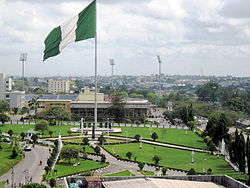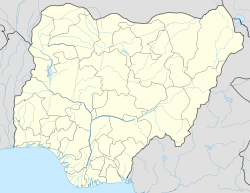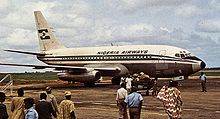- Calabar
-
Coordinates: 4°57′00″N 8°19′30″E / 4.95°N 8.325°E
Calabar
Atakpa— City —
FlagLocation in Nigeria Coordinates: 4°57′N 8°19′E / 4.95°N 8.317°E Country  Nigeria
NigeriaState Cross River State Area – Total 233.2 sq mi (604 km2) Population (2005) – Total 1,200,000 Time zone WAT (UTC+1) Website http://www.crossriverstate.gov.ng/ Calabar (also referred to as 'Canaan City')[1] is a city in Cross River State, southeastern Nigeria. The original name for Calabar was Atakpa, from the Jukun language.[2][3] The city is watered by the Calabar and Great Kwa Rivers and creeks of the Cross River (from its inland delta).
Calabar is the capital of Cross River State. For the purpose of administration, the city is divided into Calabar Municipal and Calabar South LGAs. It has an area of 406 km² and a population of 371,022 at the 2006 census.[4]
Contents
History
The original town was known as Atakpa from the Jukun words Ata and Akpa.[3] The spelling Calabar remained till the British came and pronounced Calabar as Calabah. The neighboring town of Ataba took over the name and its Efik /Qua/Efut indigenes became known as Calabar pronounced Calabah till this day. Calabar is a large metroplis today with several towns like Akim, Ikot Ansa, Ikot Ishie, Kasuk, Duke Town, Henshaw Town, Ikot Omin, Obutong etc.
Sea-port city
As far back as the 16th century, Calabar had been a recognized international sea port, shipping out goods such as palm oil.[5] During the era of the Atlantic slave trade It subsequently became a major port in the transportation of African slaves. Most slave ships that transported slaves from Calabar were English, at around 85% of these ships being from Bristol and Liverpool merchants.[6] Old Calabar (Duke Town) and Creek Town, 10 miles northeast, were crucial towns in the trade of slaves in that era.[1] The first British warship to sail as far as Duke Town, where she captured seven Spanish and Portuguese slavers, may have been HMS Comus in 1815.[7]
The main ethnic group taken out of Calabar as slaves were the Igbo, from the neighboring Igbo land.[8] African-American writer and slave John Jea was from the area. There was also a small Mulatto community of merchants with links to missionary and other merchant colonies in Igboland and Lagos, and across the Atlantic to Britain's colonies in the Americas.
First Nigerian capital city
The city once served as the seat of Government of the Niger Coast Protectorate, Southern Protectorate and Oil River Protectorate. It is thus effectively the first Nigerian capital city.
Landmarks
As a social centre the city boasts of the first social club in Nigeria, The Africa Club, and hosted the first competitive football, cricket and field hockey games in Nigeria. Among the city's firsts includes the first Roman Catholic Mass (held at 19 Bocco Street, Calabar – 1903) and the oldest secondary school (Hope Waddell Training Institution – 1895) in eastern Nigeria. The School later produced the first President of Nigeria, Nnamdi Azikiwe.[citation needed]
The city boasts of an International Museum, a Botanical Garden, a Free Trade Zone/Port, an International Airport and Seaport, an integrated sports stadium complex, a cultural centre, one of the most prominent universities in the country the University of Calabar, a slave history park and several historical and cultural landmarks. It also boasts of several standard hotels, resorts and amusement parks. The former Liberian warlord Charles Taylor lived in the old colonial palace in the city under an agreement which led to the end of his country's civil war before fleeing extradition to Liberia in March 2006.[citation needed] The Tinapa Resort, a development by the Cross River State government, lies to the north of the city beside the Calabar Free Trade Zone.[9]
The Cross River State Annual Christmas Festival held every year attracts thousands within and beyond Nigeria. The Festival which include music performance from both local and international artists, the annual Calabar Carnival, Boat regatta, Fashion shows, Christmas Village, traditional dances and the annual Ekpe Festival is a yearly events that bring in thousands of tourists at the time of the year. The official website of the Cross River Festival has more information on the upcoming 2007 Christmas Festival in Cross River State.
Political authority
Calabar has three principal landlord kingdom, namely The Qua Kingdom of ejagham (Ekoi)/bantu origin, The Efut and the Efik Kingdoms. The Qua Kingdom has the Ndidem of the Qua nation as the Grand patriach,The Efut have the Muri munene as the grand patriarch while the Efik Kingdom partriarch is knowns as the Obong. The Efik political authority as it concerns the Obong is hinged on a political tripod, Creek Town, made up of Ambo, Cobham and Eyo; Old Town made up of Obutong; and, Duke Town or Atakpa made up of Duke/Archibong, Eyamba, Ntiero, Henshaw and Cobham. Each leg of this tripod at one time or the other was ruled by a separate Obong. Within the last 100 years, a gentleman’s agreement to merge these three zones into one, with a single titular head as the Obong, and the distribution or opening up of the title to all Efik wards, was arrived at. It is the attempt to do away or dishonor this ‘contract of understanding’ that is at the root of the Obong of Calabar crises. Each of the aspirants to the throne is eminently qualified, none no more so, than the other. The title of the Obong of Calabar had been held by Nsa Effiom and Ekpo Nsa in the 17th century, these two gentlemen were from the Henshaw ward. Attempts by the Henshaw to have an Obong resulted in a war in 1870. The Henshaws did not attain this title again until the last 50 years when David Henshaw became Obong. Cobham Town where Bassey Ekpo Bassey hails from had their first and only Obong recently. All these were made possible because of ‘the contract’.[citation needed]
Calabar Kingdom
Before colonial period, Calabar, originally known as Akwa Akpa, was a Kingdom with the City of Calabar as the site of government, the Obong of Calabar as the ruler and the Ekpe Secrete Society, Ekpe, as the stool on which the Obong of Calabar sat.
Calabar people
As used in Nigeria, the term Calabar People refers to both the indigenes of Calabar City as well as the people of the original South Eastern State of Nigeria which is at present the people of Akwa Ibom State and Cross River State.
Calabar is also the Headquarters of the Eastern Naval Command.[10] The City has a new model school, Nigerian Navy Secondary School, situated in a serene part of Akpabuyo, about 10 minutes drive from the Airport. This new school complements favourably the existing Nigerian Navy Primary School and Naval Officers Wives Association Primary School both situated at Ikot Ansa Calabar to provide quality education.
References
- ^ a b Falola, Toyin; Amanda Warnock (2007). Encyclopedia of the Middle Passage: Greenwood Milestones in African American History. Greenwood Publishing Group. p. 92. ISBN 0-313-33480-3. http://books.google.com/books?id=62EMURNnLssC&pg=PA92.
- ^ National Resource Center for African Studies (2006). The international journal of African studies (National Resource Center for African Studies) 5-6.
- ^ a b Afigbo, Adiele Eberechukwu (1987). The Igbo and their neighbours: inter-group relations in southeastern Nigeria to 1953. University Press. p. 69. ISBN 9-781-54583-6.
- ^ Simon O. Ering (2010). "The Population Situation in Cross River State of Nigeria and Its Implication for Socio-Economic Development: Observations from the 1991 and 2006 Censuses". http://jeteraps.scholarlinkresearch.org/articles/THE%20POPULATION%20SITUATION%20IN%20CROSS%20RIVER%20STATE_OCTOBER-1.pdf.
- ^ Iliffe, John (1995). Africans: The History of a Continent (illustrated, reprint ed.). Cambridge University Press. p. 149. ISBN 0-521-48422-7. http://books.google.com/books?id=dlHE51ScKTUC&pg=PA149.
- ^ Sparks, Randy J. (2004). The Two Princes of Calabar: An Eighteenth-century Atlantic Odyssey. Harvard University Press. p. 39. ISBN 0-674-01312-3. http://books.google.com/books?id=Tt6BCT-9yEgC&pg=PA39.
- ^ Marshall (1835), Vol. 4, Part 2, p.129.
- ^ Chambers, Douglas B. (2005). Murder at Montpelier: Igbo Africans in Virginia (illustrated ed.). Univ. Press of Mississippi. p. 22. ISBN 1-578-06706-5. http://books.google.com/books?id=PrPxWLSrp78C&pg=RA1-PA22.
- ^ "Tinapa Free Zone & Resort". African Sun. 09 March 2009. http://www.africansunhotels.com/blog/index.cfm/2009/3/9/Tinapa-Free-Zone--Resort. Retrieved 2011-09-09.
- ^ Hackett, Rosalind I. J. (1989). Religion in Calabar: The Religious Life and History of a Nigerian Town. Walter de Gruyter. p. 180. ISBN 3-110-11481-X. http://books.google.com/books?id=sZMGD7vbluYC&pg=PA180.
- Marshall, John ( 1823-1835) Royal naval biography, or, Memoirs of the services of all the flag-officers, superannuated rear-admirals, retired-captains, post-captains, and commanders, whose names appeared on the Admiralty list of sea officers at the commencement of the present year 1823, or who have since been promoted ... (London: Longman, Hurst, Rees, Orme and Brown).
External links
Categories:- Calabar
- Populated places in Cross River State
- Nigerian state capitals
- Port cities and towns in Nigeria
- Cross River (Nigeria)
Wikimedia Foundation. 2010.




